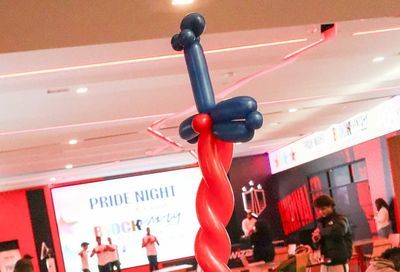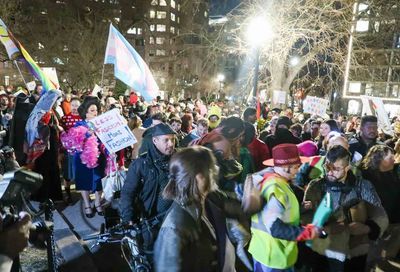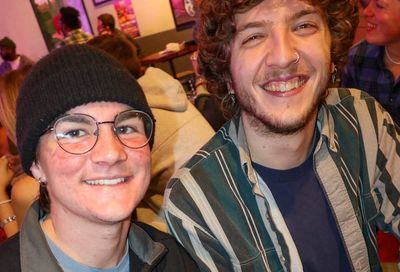Southern Success Story
Learning Curve
Yep, I spent Passover weekend in a pig barn in Ovett, Mississippi. Not kosher, you say? Ah, but I was onstage, emceeing the show, content to be back at one of my favorite radical spaces in America: Camp Sister Spirit, the lesbian-feminist educational retreat founded in 1993 by Wanda and Brenda Henson.
For ten years, off and on, I’ve worked with this annual women’s music festival in the Deep South, sometimes as emcee, sometimes as a workshop presenter or guest author, often leading a Passover seder for interested folks (many of whom were raised, like Wanda, as charismatic, evangelical Baptists.) And the story of Camp Sister Spirit’s survival is as much of a miracle as those of the recent Easter and Passover holidays.
|
Wanda and Brenda originally met in January 1985 at an abortion clinic defense. Both had two children from their young marriages and had fled from domestic violence, searching for, yet scared by, what lesbian feminist activism could mean in the Gulf Coast of Mississippi. Honoring their own love commitment by taking the shared surname of Brenda’s mother, the Hensons found their lives changed further after attending the Southern Women’s Music and Comedy Festival, produced in Georgia by lesbian stand-up comic Robin Tyler. In her frequent speeches and in the recent documentary film “Radical Harmonies,” Wanda refers to the near-suicidal desperation she felt as an isolated, ex-Holiness lesbian trying to effect change — until she met Robin. Inspired to start their own gathering for the many Mississippi lesbians too poor to travel to other festivals, the Hensons first opened a feminist bookstore called Southern Wild Sisters, and by 1989 produced the first Gulf Coast Festival at a local Girl Scout Camp.
It wasn’t easy. Homophobia, and even anti-Semitism (from church camp owners who opposed the Passover seders I helped lead) made the annual search for a festival space both expensive and demoralizing. One year, men came on the land to “check up” on the women. And sometimes festival goers had to be reminded of the Henson’s clean and sober policy — an important statement ensuring that festival culture could serve as an alternative to the bar scene. Money was always an issue, as Mississippi continues to be the poorest state in the nation, but the constant fundraising efforts benefited from Wanda’s own outreach speaking style, honed in her days as a youth preacher. Finally, the Hensons began pursuing the purchase of their own land, a base not just for the annual festival but for year-round service projects and outreach to local women.
In summer 1993, with $60,000 donated by supporters from across the United States, a 120-acre pig farm in Ovett was purchased and thus Camp Sister Spirit was born. What followed, however, was a sadly predictable siege of harassment from neighbors, local law enforcement, and “family values” groups in and out of the state. By February of 1994, then-Attorney General Janet Reno had to be called in to mediate. The Hensons’ puppy had been shot, stuffed with sanitary napkins, then draped over the camp mailbox with the note “Die Bitch.”
Bomb threats, roofing tacks placed on the driveway to puncture the Hensons’ tires, and constant letters to local papers threatening that the Hensons were out to “recruit” local wives all contributed to an environment of ongoing terrorism. Neighbors fired rounds of ammunition from semi-automatic weapons across the camp lines. Nevertheless, dedicated performers, financial contributors, and fans continued to make the trek to Ovett to attend the annual festival, work on the land, and show support for the tiny island of lesbian spirit and spirituality. After a grueling year of hearings and countersuits, in July 1995 Judge Frank Mackenzie ruled against the “nuisance” suit brought by Mississippians For Family Values and declared that, yes, the Camp could legally serve as a retreat.
With persistence and steady publicity, the Hensons have succeeded. Throughout the mid-1990s, hundreds of young college women chose to take a working spring break doing maintenance at the camp. Articles, talk shows, documentary segments, and book chapters highlighted Camp Sister Spirit’s struggle, its ever-growing gay and lesbian library, its food bank program, and the services provided to women and children fleeing domestic violence. Once thoroughly unwelcome in the local community, today Wanda and Brenda own a home in town, serve on volunteer organizations, assist black Mississippians with negotiating their own first-time home purchases, and are completing graduate degrees in education. Wanda works as a nurse practitioner; Brenda, while ever the serene activist, is now on disability from post-traumatic stress brought on by a decade of daily harassment. This most recent festival — the fifteenth — celebrated their extraordinary achievement in literally building lesbian culture from the ground up.
Having known Wanda and Brenda almost from the beginning, I’ve been an advocate for their work while living in communities both liberal and indifferent to the realities Southern lesbians face. Many urban gay and lesbian activists more comfortably accustomed to concerts, youth centers and gay clubs within walking distance see places like rural Mississippi as environments to leave when you can — not as regions homegrown activists choose to stay in and help change. That sort of work seems reserved for a special breed of angel like the Hensons, though after years of hassle from the religious right, Wanda and Brenda might resist such language. Still, I’ll let my admiration speak. I know I have felt heaven on that land.
Bonnie J. Morris, Ph.D., is on the women’s studies faculty at George Washington University and Georgetown University. She can be reached at bmorris@metroweekly.com.
Support Metro Weekly’s Journalism
These are challenging times for news organizations. And yet it’s crucial we stay active and provide vital resources and information to both our local readers and the world. So won’t you please take a moment and consider supporting Metro Weekly with a membership? For as little as $5 a month, you can help ensure Metro Weekly magazine and MetroWeekly.com remain free, viable resources as we provide the best, most diverse, culturally-resonant LGBTQ coverage in both the D.C. region and around the world. Memberships come with exclusive perks and discounts, your own personal digital delivery of each week’s magazine (and an archive), access to our Member's Lounge when it launches this fall, and exclusive members-only items like Metro Weekly Membership Mugs and Tote Bags! Check out all our membership levels here and please join us today!




















